unit2 classroom olympics
人教版必修2Unit2TheOlympicgames优秀教案

能力目的:Unit 2The Olympic gamesPeriod One1.Develop students’ reading ability and let them learn different reading skills.2.Enable students to learn to talk about the Olympic Games.情感目的:1.Arouse students’ great interest in Olympic Games.2.Develop students’ sense of cooperative learning.教学重点:1.Develop students’ reading ability.2.Enable students to learn to talk about the Olympic Games.3.Let students learn to use comparing and contrasting when writing.教学办法:1.Task-based teaching method2.Cooperative learning3.Discussion教学过程:Step 1 lead-in and warming upWhat sports do you like? Do you want to take pert in-the Olympic Games?Step 2 Pre-readingWhen and where will the next Olympic Games be held?Step 2 reading一、Read the first paragraph and fill in the blanks.Pausanias, who was a Greek writer about years ago, has come on a magical journey on March 18th, to find out about the present-day Olympic Games. He is now interviewing Li Yan, a volunteer for the Olympic Games.An InterviewInterviewer:Interviewee(接受采访者)Topic二、Look through the passage and then match the questions and answers.1.How often do you bold your Games? a. There are no running races or horseRiding event in winter Games.2.How runners enjoy competing in winter? b. Every country wants the opportunityAnd what about the horses?3.All athletes are from the Greek world? c. A special village is built for them toLire in.4.Where ear all athletes housed? d. Every four year.5.Does anyone want to host the Olympic Games? e. It’s all about being able to run faster,Jump higher and throw further6.Has the olive wreath been replaced? f. Any country can take part if theirDo you compete for prize money too? Athletes are good enough.From the questions and answers, we learn something about modern Olympics and Olympics.三、Scan the text and fill in the table.Compare ancient and modern Olympic Gamesthe main ideaIn this lesson, we learn the and between Ancient Olympics and Modern Olympics.四、Answer the following questions1.When pausanias hears that women are allowed to join in, what does he say? How about his feeling, sad, surprised or happy?2.Why does Pausanias think Li Yan should feel proud?3.Why does think people may be competing for money in the modern Olympic Games?Step Ⅳ: Read the beginning and ending of the interview dialogue)An Interviewbeginning: self-introductionStructure middle: questions + answersEnding: expressing thanksStepⅤ: Interview ActivitySupppose(假设)one is Li Yan and the other is PausaniasUseful expressions:My name is…, I am from…,May I ask you some questions about …?How often …?Thank you so much for your time.StepⅥ: SummaryThe Olympic Games are the biggest sports meeting in the world, which Include two kinds, the and . Both of them are every . All countries can takepart if their athletes reached the for their event. Women are not only to join in but playing a very role. A village is built for the competitors to live in. It’s a great to host the Olympic Games. The olive wreath has been by medals. But it’s still about being bale to run, jump and throw .Step Ⅶ: Homework1.Remember to finish the self-evaluation.Period two三维目的知识目的1.Get students to know the structure of the present future passive voice.2.Let students learn the usages of the present future passive voice.能力目的Enable students to use the present future passive voice correctly and properly.情感目的1.Get students to become interested in grammar learning.2.Develop students’ sense of group cooperation.教学重点Enable students to learn how to use the present future passive voice correctly.教学难点1.Task-based teaching method2.Cooperative learning and practice教学办法教学过程Step 1 Grammar revision1.Review the passive voice1)the present passive voice: am/ is/ are + p. p.2)the present continuous passive voice: am/ is/ are + being + p. p.2.Fill in the blank with the right form of the verb given.1)Their house (paint) and they have to live with their parents.2)Visitors (request) not to touch the exhibits.3)In some parts of the world, tea (serve) with milk and sugar.4)The news article (write) at present.Suggested answers:1) is being painted 2) are requested 3) is served 4) is being written3.Do Page 13 Exercise 3 to review the passive voice by making a poster.Step 2 Grammar learning1.Reading aloud and discoveringAsk students to turn back to page 9 to go through Pre-reading and the passage An Interview. Let them pick out the sentences in the present future passive voice and translate them into Chinese.2.Looking and thinkingLet students look at the tense used in the sentences they picked out and think over this question: What is the structure of the present future passive voice?3.Summing upThe structure of the present future passive voice is “s hall/ will + be + p. p.”. It is a combination of the future tense and the passive voice. We also can use the structure “is/ am/ are to be + p. p.”for the present future passive voice.Step 3 Grammar practice1.Turn to page 13. Ask students to do Exercise 2 to help the officials make some rules for the Olympic Games, using the present future passive voice.2.Turn to page 50. Ask students to do Exercise 1 and Exercise 2. Check the answers after most of them finish.Step 4 Closing down by consolidation exercisesTurn the following sentences into passive voice.1)They will put up a notice on the wall.→.2)Have you sent for a doctor?→.3)I have never heard of such a thing before→.4)We must take good care of the children here.→.5)His classmates laughed at him for the foolish mistake.→.Suggested answers:1)A notice will be put up on the wall.2)Has the doctor been sent for?3)Such a thing has never been heard of before.4)The children must be taken good care of here.5)He was laughed at for the foolish mistake by his classmates.Step 5 Summary1.普通将来时的被动语态的使用方法:(1)表达根据计划或者安排将要发生的被动动作。
高中英语新课标必修二 Unit2 The Olympic Games重点词组句子归纳总结

新课标必修二Unit2 The Olympic Games重点词组句子归纳总结重点词组:1.take part in/join in 参加2.the spirit of 精神、宗旨、灵魂3.used to 过去常常4.find out 查明,找出5.every four years 每四年,每隔三年6.two sets of 两套,两组7. allow sb. in(out) 允许进入(出去);allow sb. to do sth.允许某人做某事(不能说allow to do)allow doing sth. 允许干某事。
8.be/get married(强调状态)+to(不能用with) sb 和……结婚9.a set of 一套,一组10.compete in…在某方面竞争compete for…为……而竞争compete with/against 与……竞争11.be admitted to 获准做某事be admitted as 作为…被接受12.reach the standard 达到……水平、标准13.play an important role/part in在…方面扮演重要角色(起重要作用)14.as well as 和……一样15.thank you for your time 感谢您(能抽空……)16.come from the same root 同根17.have (no) chance of doing sth. 有(没)做……的机会18.go with 伴随,与……搭配19.relate…to…把……与关联起来relate with 和……有关20.run against…和……赛跑21.hear of 听说22.make sure 确定make sure +that clause 确定23.take turns 轮流24.one after another 一个接一个单词解析拓展:1)honest(指人)诚实的,老实的,正直的。
新人教版必修二Unit2TheOlympicGames全单元教案新部编本

教师学科教案[ 20 – 20 学年度第__学期]任教学科:_____________任教年级:_____________任教老师:_____________xx市实验学校Unit 2 The Olympic GamesI.教学内容分析本单元的中心话题是“奥运会”。
Warming Up部分通过讨论让学生了解古代和现代奥运会的异同。
Pre-reading部分的三个问题则进一步考查学生对奥运会基本常识的了解。
Reading部分作者通过一个虚拟的采访向读者介绍了古代奥运会与现代奥运会的异同。
Comprehending部分帮助学生归纳他们已知的和刚学到的关于古代与现代奥运会异同,并且进一步讨论奥运会相关知识。
Learning about Language部分都同单元主题紧密相关,词汇和语法结构的呈现也尽可能地安排在相关的语境中。
Using Language部分通过一个希腊神话故事来引导学生进行读、听、说、写的综合训练。
Learning Tip部分鼓励学生在两人活动和小组活动中积极发言,这样既可以消除害羞的心理,又有利于学生掌握恰当的交际策略。
II.教学重点和难点1.教学重点(1) 本单元的生词和短语;(2)学会使用将来时的被动语态;(3)让学生熟悉奥运会—世界上最重要的体育盛会;能用英语就奥运会的基本知识进行互相问答,并能简述奥运会的基本知识;(4)鼓励学生表达自己的兴趣爱好,要多让学生讲自己熟悉的话题。
2.教学难点(1) 指导学生按类别归纳整理词汇,让学生学会有效的记忆词汇的方法;(2) 引导学生发现本单元重点语言结构,让学生自己发现并感悟相关的语言规律,培养他们的语感。
III.教学计划本单元分五课时:第一、二课时:Warming up,Pre-reading, Reading, Comprehension第三课时:Learning about Language第四课时:Reading, Writing (Using Language)第五课时:Listening, Speaking, Writing (Using Language)IV.教学步骤:Period 1&2 Warming Up, Pre-reading, Reading, Comprehension Teaching Goals:1.To arouse Ss’ interest in learning about the history of the Olympics.2.To read an interview about the Olympics.Teaching Procedures:Step 1. Leading-inPurpose: To activate Ss and arouse them to talk about mascots in the Olympic Games.Show the pictures about the 2008 Olympic mascots (吉祥物). Ask Ss whether they know some other mascots (吉祥物).Step 2. Warming UpPurpose: To lead Ss to the topic of this unit through a quiz.Pair work: Get Ss to talk about the questions below, and then ask them to present it before the class.1.When and where did the ancient Olympic Games start?A. 776BC; OlympiaB.393BC; RomeC. 1896; Greece2.When did the ancient Olympics stop?A. 776BCB. 393BCC. 1888AD3.When and where did the modern Olympic Games start?A. 1888AD; PairsB. 776BC; OlympiaC.1896; Athens4.When did China first take part in the Olympics?A. 1932B. 1928C. 19365.Who was China’s first gold medal winner and for what event?A. Zhou Jihong; divingB. Lining; gymnasticsC. Xu Haifeng; shooting6.Do you know the three words that show the spirit of the Olympic Games?A. taller, faster, strongerB. higher, swifter, strongerC. stronger, quicker, longerSuggested Answers: 1. A 2. B 3. C 4. A 5. C 6. BStep 3.Pre-readingPurpose: To have Ss learn about some more about Olympics and arouse their interest.Individual work: Get Ss to answer this question individually.1.How many events are there for the Summer and Winter Olympics? Can you list some of them?2.When and where will the next Olympics be held? What do you think the Chinese team willdo in order to win more medals?Suggested Answers:1.In the Summer Olympics, there are running, swimming, shooting, wrestling, jumping,football, basketball, volleyball, table tennis, throwing. Javelin, weight lifting, gymnastics,boxing, etc. In the Winter Olympics, there are skiing, skating, ice hockey, ski jumping, sledding, snow-boarding, etc.2.The 29th Olympics will be held in Beijing on August 18th, 2008.Step 4. Reading1. ListeningPurpose: To get a brief understanding of the text.To train Ss’ listening ability.(1) Listen to the tape.(2) Ask Ss to find the writing type and the main idea of the text.The writing type: conversational style (an interview).Main idea: comparing the differences between Ancient and Modern Olympics.2. ScanningPurpose: To get Ss to have some details in the text.Read the text quickly and find out the similarities & differences between Ancient and Modern Olympics.(1) What are the similarities?How often Both are held every four years.What for Both are held not for money but for honour.Beliefs They are the same. Swifter, Higher, and Stronger.Competitors Men are allowed to take part both in ancient and modern Olympics.Events Some events are the same, such as running, jumping, shooting, andthrowing.(2) What are the differences?Ancient ModernGames Summer Summer & winterCountry Only Greece Countries from all over theworldCompetitors Only men Men and womenPrize Olive wreath MedalEvents A few Many more3. Read the passage carefully and silently and finish Ex2 (P11).Suggested Answers:(1) Pausanias is amazed that many countries take part in the Olympic Games andwomen too and there are two sets of Games-the Winter and the Summer Olympics.(2) Because Li Yan has explained that it is a great honour to host the Olympic Games..(3)He thinks that so many things have changed in the Olympic Games that he fearsthat the spirit of the Olympics may have changed too.4.DiscussionYou know our government has tried its best to compete for hosting the 29th Olympic games. It hascost a lot of money. Do you think it is worthwhile? Why?For your reference:It is worthwhile to host the Olympic games. To host Olympic Games can make our culture andpeople understood by the other peoples. To host Olympic Games can make our country known tothe whole world. To host Olympic Games can stimulate our economy, and help to speed up itsdevelopment.5. ImaginationImagine what we will do and what we can do for the 29th Olympic Games.For your reference:Maybe we can serve as volunteers to help the foreign visitors and athletes from all over the world.So at present we should study hard. Especially we should try our best to learn English well.6. SummaryAs we have finished the passage we’ll sum up what we have learned. First let’s see the writin It is written in a conversational style. It’s in a very interesting way. It adopts a dialogue between Pausanias who lived 2000 years ago and a Chinese gird in modern world. Through their dialogue,the differences and similarities between the ancient and modern Olympic Games are made knownto the readers. Just because it is in a conversational style, there are quite a few oral spoken Englishand elliptical phrases.Through the comparison between the ancient and modern Olympic Games, we have learned thedifferences and the similarities between them. Now we can have a deep understanding of the Games.From the passage, we can have a deep understanding of the Games. From the passage, we can alsoget to know that the Olympic Games are developing and improving. It’sour duty to make theOlympic Games better and healthier. We know that one of the slogans for 2008 Beijing OlympicGames is Green Olympic Games. It shows that people are paying more and more attention to ourenvironment.7. Language pointsPurpose: To train Ss’ language capacity.Divide Ss into four groups and ask each group to discuss how to understand and use the new wordsand analyze the following phrases. Give Ss enough time to learn the language points by heart.take part in…, in order to, find out, used to, be admitted as…, compete against…, for the h of…, be admitted to…, play a role, as well as, , as a matter of fact, compete for…, proud8. RetellingPurpose: Train students’ ability of summarizing and expressing.We can see the text is written in a conversational style. And there are two speakers. One is Pausanias,a Greek writer 2000 years ago, the other is Li Li, a Chinese girl. Now let’s change it into a n style. In other words, let’s describe the ancient and modern Olympic Games in our own words. Whowould like to have a try?For your reference:The ancient Olympic Games began in Greece and were held from 776 BC to AD393. It was heldevery four years. At that time, there were not so many sports as today. And women were not allowedto take part in the games. There were not Winter Olympics at that time. Winners got the olive wreathas the prize. The motto was swifter, higher and stronger.The modern Olympic Games began in 1891. They’re held every four years. There are many newsports in the Olympics. In the summer Olympics there are over 250 different sports. Women are notonly allowed to join in but also play a very important role. Now the competitors compete for medals.The motto is swifter, higher and stronger.Winners got the olive wreath as the prize. The motto was swifter, higher and stronger.The modern Olympic Games began in 1891. They’re held every four years. There are many newsports in the Olympics. In the summer Olympics there are over 250 different sports. Women are notonly allowed to join in but also play a very important role. Now the competitors compete for medals.The motto is swifter, higher and stronger.Period 3 Learning about languageTeaching Goals:1. To enable Ss to master some new and useful words and expressions.2. To get Ss to have knowledge of this grammar point: future passive voice.3. To learn the methods of word formationTeaching Procedures:Step 1. Warming UpMake preparations for the grammar by reminding Ss of several important sentences in the text.(1) When and where will the next Olympics be held?(2) I live in what you call “Ancient Greece” and used to write about the Olympic Games more than2,000 years ago.(3) All countries can take part if they reach the standard to be admitted to the games.(4) The next Olympic Games will be held in my hometown.(5) It is just as much as a competition among countries to host the Olympics as to win an Olympicmedal.Step2. Word formation1.Rules of word formationTurn to page 12, finish Ex 1 and find out the rules of word formation.Suggested answers: pete 2.admit 3.athlete/competitor 4.standard5.regular basis6.replace7.motto8.responsibility9.gymnasium 10.take part in(1) By adding–ing to a verb, we can change the verb into a noun, which means we can “doi sport” into “ the name of the sport”.(2) By adding–er to a verb, we can change the verb into a noun, which means we can changesome sport” into “the person who does the sport”.2.Means of word formationAffixation, conversion, and compounding are the chief means of word-formation in English.Do Ex2 and Ex3 of P12.Suggested answers:Ex2: 1B 2B 3B 4C 5BEx3: athlete compete admitted standard homeland responsibility olive wreathStep3. GrammarTurn to page 13 and do Ex1. And tell the class the formation of future passive voice.We can follow the following ways of formation to turn the future tenses into the future passive voice:be going to be done,be about to be done,be to be done,will\shall be done,would\should be done.Do Ex2 of P13.Suggested answers:1.will be allowed2.will not be allowed, will be taken away3.will be allowed4.will not be excused, will be told, will be punished5.will be allowed, will be finedStep 4. Summary1. Summary of the future passive voiceAffirmative Negative InterrogativeI will (shall) You willHe\She\It will We will (shall)I will (shall) notYou will notHe\She\It will notWe will (shall) notWill (Shall) IWill youWill he\she\itWill (Shall)You\They will You\They will not Will you\they2. Summary of phrasal verbs in the passive voiceWe should note that all the phrasal verbs are used as a whole.For example:(1) At last they put out the fire. →At last the fire was put out.(2) They will put up a notice on the wall. → A notice will be put up on the wall.(3) Have you sent for a doctor? →Has a doctor been sent for?(4) I have never heard such a thing before. →Such a thing has never been heard of before.(5) We must take good of the children here. →The children must be taken good of here.(6) His classmates laughed at him for the foolish mistake. →He was laughed at for the foolishmistake by his classmates.Period 4. Reading, Writing (Using Language)Teaching Goals: 1. To learn more about the ancient Olympic Games.2. To learn to imagine and write an ending of an unfinished passage.Teaching Procedures:Step 1. Leading-inPurpose: To review some words related to the passage.Stimulate Ss’ interest in fairy tales about the ancient Olympic Games.T: In the first text, we have learned something about the Olympic Games, yes or no?S: Yes.T: Can you still remember where the ancient Olympic Games started?S: GreeceT: What do you call the people or the language of this country?S: GreekT: Greece is an ancient country full of stories; do you think so?S: Yes.T: Now, let’s look at the picture coming from the ancient country.King Princess Hippomenes GoddessT: Class, it is obvious that the two pictures tell us a magical legend. Do you know what happened to the four persons?S: NoT: Ok, next let’s turn to page 14 and read the story about the four persons.Step 2. Reading1. SkimmingPurpose: To get a brief understanding of the passage.Read the text quickly and find out the relationship among the four persons.2. ScanningPurpose: To get Ss to have some details in the text.Read the text again and then do the following true or false questions.(1) Atlanta could run faster than any man. ( )(2) At first Hippomenes understood why men ran against Atlanta. ( )(3) Atlanta was not confident she would win. ( )(4) She made as many men as she could share her pain. ( )(5) Her father did not refuse her wish to choose a husband in a race. ( )Suggested Answers: (1) F (2) F (3) F (4) T (5) T3.Reading and answeringPurpose: To make Ss further understand the text.Read the text in silence, and answer the following questions.(1) What was Atlanta’s problem?(2) What were Atlanta’s rules?(3) Why did Hippomenes think that the men who ran the race were so foolish?(4) What made Hippomenes change his mind?(5) Whom did Hippomenes turn to for help?Suggested Answers:(1) Atlanta could run faster than any men in Greece. But she was not allowed to run in the Olympic Games.(2) She promised to be married to a man who could run faster than her. If he could not run as fast as her, he would be killed.(3) Hipppomenes could not understand why so many young men wanted to risk their lives.(4) Atlanta’s beauty made him understand his amazement and change his mind.(5) He turned to the Goddess of love for help.4.Talking and writingGroup workAsk Ss to talk about the possible ending in groups of four. After discussing, let every student write down the result they have got. And then ask some Ss to read out their results.For your reference(Various possible endings are allowed. Here are three kinds of different results.):(1). Hippomenes was killed because of losing his race.(2). Hippomenes ran faster than Atlanta and married her.(3). Atlanta and Hippomenes fell in love with each other at first sight. In spite of this, he still hadto run the race, and unfortunately he lost the race and was killed by the king without beingstopped by Atlanta in time. Atlanta was so sad that she killed herself before Hippomenesbody.5.Homework.Get Ss to read and underline all the useful expressions in the passage. Copy them to yournotebook as homework after class.Useful expressions in The Story Of Atlanta:be allowed to, hear of…, as fast as, change one’s mind, ask… for …from…, pick up, confident about…, compete with…Period 5 Listening Speaking & WritingTeaching Goals: 1.To Learn to talk about hobbies.2. To develop Ss’ listening ability.3.To learn to write about hobbiesTeaching Procedures:Step 1. ListeningPurpose:1. To get the main information in the listening part.2. To develop Ss’ listening ability3. To learn about the real ending of the story of Atlanta..1.Before listening, try to work out the order of Ex3 (P15).Suggested answers:(4)One man wanted to win and marry Atlanta very much.(11)Atlanta married him and they lived happily ever after.(7)When the race began ,Atlanta ran past him.(5)He asked the Goddess of Love for help.(1)Atlanta was a very beautiful princess.(3)Many men tried to compete with her, but failed and so were killed.(9)She stopped to pick them up.(6)She gave him three golden apples.(10)She ran too slowly and he won.(8)He threw the golden apples one after another.(2)She could run faster than any man in Greece.2. Listen to the tape and finish Ex4 (P15).Answer: This is a story of how a man marries a princess by winning a race with a Goddess3. Listen to the tape again and finish Ex5 (P15)Answer: don’t want, to die, to go away, will not be run, her rules, will marry the man, runsfaster, Come on4. Discuss the questions of Ex6 (P15)5. After finishing the three exercises, ask Ss to retell the passage with expression.Step 2. SpeakingPurpose: To get Ss to talk about records about high tight-rope walking.Group workCarry out a survey of the interests in the class and write down the names of the classmates who havethe same interests. You can carry out the task like this.Which do you like, sports, music or collections?Which of the sports do you like best?What is your favorite sport?Are you interested in table tennis?After the survey, the Ss who have the same interests sit together and please work in groups of four to talk about their interest. At last, let Ss present their dialogues.Step 3. Writing a descriptionPurpose: To learn to write a passage entitled “My favorite sport”.Step 4. Homework1.Go to the library to read or get online to search in order to find more information on the OlympicGames and the ancient Greek mythology.2.Finish the exercises in the Workbook.。
剑桥少儿英语预备级下册知识点总结
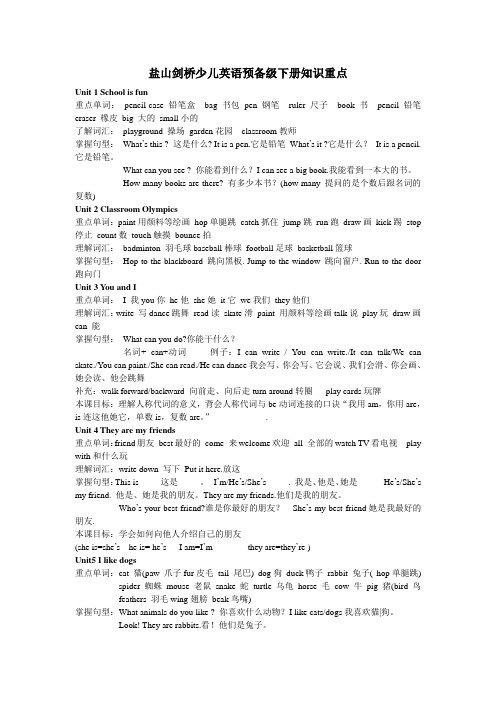
盐山剑桥少儿英语预备级下册知识重点Unit 1 School is fun重点单词:pencil-case铅笔盒bag 书包pen钢笔ruler尺子book书pencil铅笔eraser 橡皮big 大的small小的了解词汇:playground 操场garden花园classroom教师掌握句型:What’s this ? 这是什么? It is a pen.它是铅笔What’s it ?它是什么?It is a pencil.它是铅笔。
What can you see ? 你能看到什么?I can see a big book.我能看到一本大的书。
How many books are there? 有多少本书?(how many 提问的是个数后跟名词的复数)Unit 2 Classroom Olympics重点单词:paint用颜料等绘画hop单腿跳catch抓住jump跳run跑draw画kick踢stop 停止count数touch触摸bounce拍理解词汇:badminton 羽毛球baseball棒球football足球basketball篮球掌握句型:Hop to the blackboard 跳向黑板. Jump to the window 跳向窗户. Run to the door 跑向门Unit 3 You and I重点单词:I 我you你he他she她it它we我们they他们理解词汇:write 写dance跳舞read读skate滑paint 用颜料等绘画talk说play玩draw画can 能掌握句型:What can you do?你能干什么?名词+ can+动词例子:I can write / You can write./It can talk/We can skate./You can paint./She can read./He can dance我会写、你会写、它会说、我们会滑、你会画、她会读、他会跳舞补充:walk forward/backward 向前走、向后走turn around转圈play cards玩牌本课目标:理解人称代词的意义,背会人称代词与be动词连接的口诀“我用am,你用are,is连这他她它,单数is,复数are。
高中英语必修二《Unit 2 The Olympic Games》全英文说课稿

高中英语必修二《Unit 2 The OlympicGames》全英文说课稿and modern Olympic Games。
and encourage them to express their own ns.3.XXX learningabout the history and significance of the Olympic Games.In this lesson。
we will begin with a warm-up activity where students will brainstorm words and phrases related to the Olympic Games。
Then。
we will read an XXX practice note-taking skills。
After that。
we will have a XXX。
we will end with a speaking activity where students will share their own ns about the Olympic Games.The Olympic Games have a long and rich history。
dating back to ancient Greece。
Today。
the Olympic Games are a global event that XXX from all over the world。
The future passive voice is a grammar item that is used to talk about ns that will be done to someone or something in the future。
It is XXX.By learning about the Olympic Games。
高中英语_Unit 2 The Olympic Games教学设计学情分析教材分析课后反思
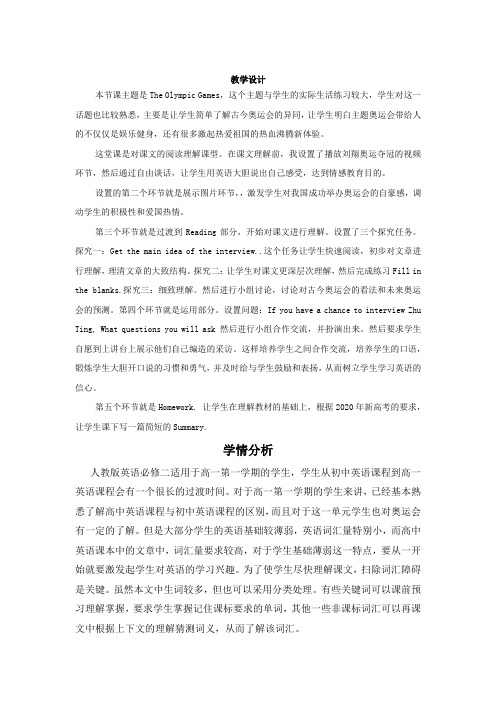
教学设计本节课主题是The Olympic Games,这个主题与学生的实际生活练习较大,学生对这一话题也比较熟悉,主要是让学生简单了解古今奥运会的异同,让学生明白主题奥运会带给人的不仅仅是娱乐健身,还有很多激起热爱祖国的热血沸腾新体验。
这堂课是对课文的阅读理解课型。
在课文理解前,我设置了播放刘翔奥运夺冠的视频环节,然后通过自由谈话,让学生用英语大胆说出自己感受,达到情感教育目的。
设置的第二个环节就是展示图片环节,,激发学生对我国成功举办奥运会的自豪感,调动学生的积极性和爱国热情。
第三个环节就是过渡到Reading部分,开始对课文进行理解。
设置了三个探究任务。
探究一:Get the main idea of the interview..这个任务让学生快速阅读,初步对文章进行理解,理清文章的大致结构。
探究二:让学生对课文更深层次理解,然后完成练习Fill in the blanks.探究三:细致理解。
然后进行小组讨论,讨论对古今奥运会的看法和未来奥运会的预测。
第四个环节就是运用部分。
设置问题:If you have a chance to interview Zhu Ting, What questions you will ask 然后进行小组合作交流,并扮演出来。
然后要求学生自愿到上讲台上展示他们自己编造的采访。
这样培养学生之间合作交流,培养学生的口语,锻炼学生大胆开口说的习惯和勇气,并及时给与学生鼓励和表扬,从而树立学生学习英语的信心。
第五个环节就是Homework. 让学生在理解教材的基础上,根据2020年新高考的要求,让学生课下写一篇简短的Summary.学情分析人教版英语必修二适用于高一第一学期的学生,学生从初中英语课程到高一英语课程会有一个很长的过渡时间。
对于高一第一学期的学生来讲,已经基本熟悉了解高中英语课程与初中英语课程的区别,而且对于这一单元学生也对奥运会有一定的了解。
但是大部分学生的英语基础较薄弱,英语词汇量特别小,而高中英语课本中的文章中,词汇量要求较高,对于学生基础薄弱这一特点,要从一开始就要激发起学生对英语的学习兴趣。
英语高一必修二人教版Unit2TheOlympicGames教学案例
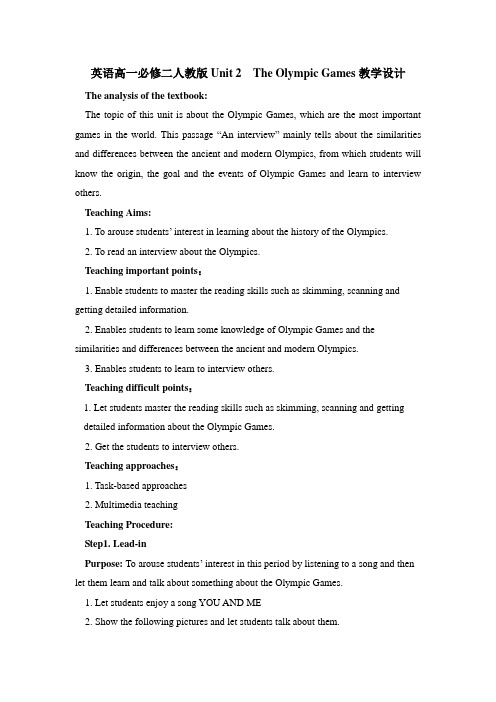
英语高一必修二人教版Unit 2 The Olympic Games教学设计The analysis of the textbook:The topic of this unit is about the Olympic Games, which are the most important games in the world. This passage “An interview” mainly tells about the similarities and differences between the ancient and modern Olympics, from which students will know the origin, the goal and the events of Olympic Games and learn to interview others.Teaching Aims:1. To arouse students’ interest in learning about the history of the Olympics.2. To read an interview about the Olympics.Teaching important points:1. Enable students to master the reading skills such as skimming, scanning and getting detailed information.2. Enables students to learn some knowledge of Olympic Games and the similarities and differences between the ancient and modern Olympics.3. Enables students to learn to interview others.Teaching difficult points:1. Let students master the reading skills such as skimming, scanning and getting detailed information about the Olympic Games.2. Get the students to interview others.Teaching approaches:1. Task-based approaches2. Multimedia teachingTeaching Procedure:Step1. Lead-inPurpose: To arouse students’ interest in this period by listening to a song and then let them learn and talk about something about the Olympic Games.1. Let students enjoy a song YOU AND ME2. Show the following pictures and let students talk about them.STEP 2 Warming upPurpose: To lead students to the topic of this unit through a quiz.Show the following questions on the screen.How much do you know about the Olympic Games?1. When did the ancient Olympic Games start?A. In 1896B. In 1906C. In 776 BC2. When and where were the first modern Olympic Games held?A. In 1986; SydneyB. In 1896; AthensC. In 1689; New York3. What do the five Olympic rings stand for?A. Five continentsB. Five well-known athletesC. Five important events4. Liu Xiang won the gold medal of the men's 110 meters hurdles at the 2008 Beijing Olympic Games. (T or F)5. Who was China’s first gold medal winner and for what event?A. Xu Haifeng; shootingB. Xu Haifeng; table tennisC. Cai Zhenhua, table tennis6. What are the official mascots for the Beijing Olympics?7. Where will the 2016 Olympic Games be held?A. In Rio, BrazilB. In AthensC. In Beijing8. The Olympic Spirit is _________.A. Friendship the first, match the secondB. Swifter, Higher and Stronger9. What’s the host city of the 2020 Olympic Games?A. TokyoB. LondonC. Athens10.What’s the slogan(口号) of the 29th Beijing Olympic Games?Suggested answers:1.C2.B3.A4.F5.A6. Five Fuwas7.A8.B9.A 10.One world ,one dreamStep3. ReadingPurpose: To train students’reading skills—skimming, scanning and getting detailed information about the ancient and modern Olympic Games.1.PredictingPurpose: To train students’ predictive ability.Ask students to predict the content according to the following information.An interviewPausanias, a Greek writer Liyan, a volunteer for the 2008Olympic Games Suggested answer: This text is an interview, so it is a dialogue about the Olympic Games between Pausanias who is from the ancient time and Liyan, a volunteer for the 2008 Olympics Games.2.Skimming for the general ideaPurpose: To get students to have the general idea of the text.(Play the tape of the text for students at the same time.)(1)The passage mainly tells about the ________and __________ between the ancient and modern Olympics.(2)The Olympic Games are held every _____ years.(3)The reason why many countries want to host the Olympics is that________________________________________________________. Suggested answers: (1) similarities, differences (2) four(3) It’s a great responsibility but also a great honour to be chosen.3. Scanning (True or false questions)Purpose: To get students to have some details in the text.(1)All the athletes can be admitted as competitors in the modern Olympics.(2)There are running races in the Winter Olympics.(3)All the countries could take part in the ancient Olympics.(4)Women play an important role in the modern Olympics.(5)Competitors in the Olympics do not compete for money.Suggested answers: (1)-(5)FFFTT4. Group workPurpose: To train students’ ability of cooperative learning.Students work in groups to tell the similarities and differences between the ancient and modern Olympics according to the passage.The ancient and modern Olympic Games(1)Similarities: a._________________________b.________________________c.________________________d.________________________Suggested answers: a. have running races b. held every four yearsc. no prize money for winnersd. seen as most important competition(2) Fill in the table.Suggested answers: 1.Summer 2.Summer 3.Winter 4.250 5.women 6.slaves 7.anyone 8.Greece 9.all over the world 10.an olive wreath 11.medals Step 4.Interview activitiesPurpose: To give students chances to practice their interviews and students are encouraged to be as imaginative as possible to act out their interviews.1. (Ask students to work in pairs. Suppose one is Pausanias and the other is a volunteer.)If Pausanias wishes to live in xi’an, he wants to know something about xi’an such as history, cultures, people, food, places of interest and so on. You are the volunteer to answer his questions. The dialogue between Pausanias and you can be like this: Dialogue (1)S1: My name is Pausanias. I lived in… I come to xi’an because…May I ask you some questions about Xi’an?S2: Good heavens! Have you really come from so long ago? But of course you can ask any questions you like. What would you like to know?S1: …2. (Students work in pairs. Suppose one is the designer and the other is a journalist.) If xi’an has the chance to host the next Youth Olympic Games, you are expected to design the emblem(会徽),the slogan, the mascots and the songs for it. Then you’ll be interviewed by a journalist.An example: The mascots of the next Youth Olympic Games are Xixi, An’an, Huanhuan, Yingying, Ninnin. It means xi’ an huan ying nin.Dialogue (2)S1: My name is …and I am a journalist from…May I ask you some questions about…S2: Of course you can ask any questions you like. What would you like to know? ... S1: Please wait a minute!...I see! ... That sounds…Well, that’s good news. …Thank you so much for your time.Homework1. More students should perform their interviews after class and finish a short passage about the interviews.2. Try to retell the passage.The blackboard。
《Classroom-Olympics》Be-a-Champion!-PPT课件
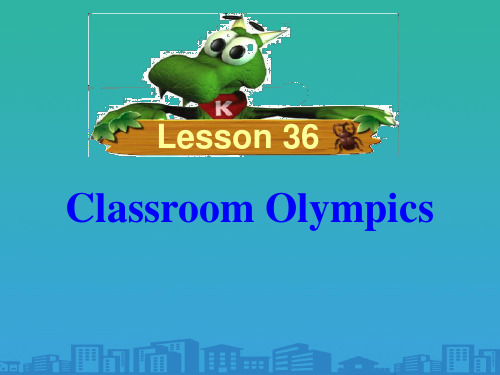
string. 3. The accident was a/an _r_e_s_u_lt__of bad
driving. 4. He went to many bookstores, but
jump rope long jump
sit-ups push-ups
1. Would you like to hold a classroom Olympics? 2. What events would your classroom Olympics have?
Obstand the letter. 2. To learn some useful words and
expressions about classroom Olympics.
Words: rope sit-up push-up race result none twentieth
Expressions: one by one
fall off
Read the lesson and answer the questions. 1. How many events did Jenny’s classmates invent for the classroom Olympics? What are they? Five. They are jump rope, long jump, situps, push-ups and “Jump over the Dinosaur”. 2. What things did they need to prepare for Danny’s event? Some paper pizzas, a cardboard donut and a toy dinosaur.
高中英语必修二第二单元教案

高中英语必修二Unit 2教案pete 比赛,竞争competitive 竞争的competitor 竞争者,竞争对手competition 竞争,比赛competence 能力,胜任compete in 参加……比赛compete for 争取获得compete with /against 同……竞争2.take part in 参加,参与Take an active part inPlay an important part in 扮演重要角色take part in,join ,join in ,attend :take part in 指参加大型活动,join指参加党派,团体,组织等,表示成为其中一员。
与某人一起做某事可以表达为:join sb. in (doing) sth. join in指参加某种活动,游戏,竞赛,娱乐。
attend 指参加会议,婚礼,典礼,上课,上学,听报告等。
3.stand for 代表,象征,表示; 主张,拥护,支持;忍受Stand up 站起来stand out 突出,显眼stand by 袖手旁观stand aside 站在一旁4.admit 准许进入,准许参加,接纳,承认be admitted to/into 被准许进入admit doing/that…承认做了……admit sb./sth. to be /as…承认某人/某物是…5.nor/neither 也不倒装结构nor/neither +助动词/be/情态动词+主语表示某人某物也不……类似于so的用法So+主语+助动词/be/情态动词表示某人某物的确……6.as well 也,又,还as well as 和……一样might/may as well do 我们不妨/还是…吧besides ,in addition to 除……之外还有as well,also,too,either 的区别as well前面不用逗号,放在句尾,用在肯定句,疑问句中also 一般放在be/情态动词/助动词之后,实义动词之前too放在句中或句末,通常用逗号隔开,用于肯定句,疑问句中。
剑桥少儿英语预备级下册
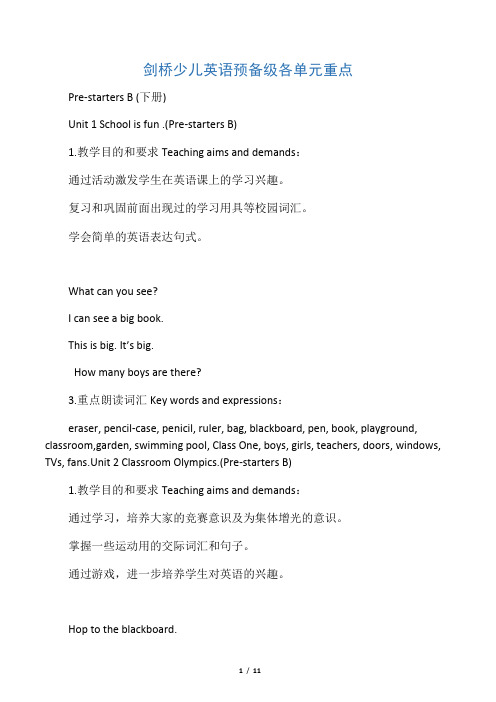
剑桥少儿英语预备级各单元重点Pre-starters B (下册)Unit 1 School is fun .(Pre-starters B)1.教学目的和要求Teaching aims and demands:通过活动激发学生在英语课上的学习兴趣。
复习和巩固前面出现过的学习用具等校园词汇。
学会简单的英语表达句式。
What can you see?I can see a big book.This is big. It’s big.How many boys are there?3.重点朗读词汇Key words and expressions:eraser, pencil-case, penicil, ruler, bag, blackboard, pen, book, playground, classroom,garden, swimming pool, Class One, boys, girls, teachers, doors, windows, TVs, fans.Unit 2 Classroom Olympics.(Pre-starters B)1.教学目的和要求Teaching aims and demands:通过学习,培养大家的竞赛意识及为集体增光的意识。
掌握一些运动用的交际词汇和句子。
通过游戏,进一步培养学生对英语的兴趣。
Hop to the blackboard.Jump to the window.Run to the door.Walk to the teacher.3.重点朗读词汇Key words and expressions:hop,paint,catch,count,run,bounce,draw,touch,football,badminton,baseball,bask etball, jump and touch, catch and count, kick and stop.Unit 3 You and I(Pre-starters B)1.教学目的和要求Teaching aims and demands:通过学习本单元,使学生正确地使用人称代词。
《Unit 2 Classroom Olympics》导学案_英

1.Show some pictures and teach the word s: up,down,kick,stop and hop.
2.Listen to the tape and find these words from the books.
Subject: English
Grade:
Unit 2
one
Title: Classroom Olympics
Class
new
types:
Designer:
Teaching aims
and demands
Pre-starters: Time:Six pe Date:
Book B
riods
Cheker:
1.Listen to the tape and read a fter the recorde r. 2.Read these w ords.
Step 4 Summarize:
e?
The students re ad the learned wor ds.
2. Review the words ab out
names,colours , places and number one-ten. 1.Teach the new word p
aint.
1.Read the new
1.Students r ead these w ords. 2. Listen to the tape an d find these words fro m the book s. 3. Ss put th
e eyes/n ose…on the face one by one. Th eothers s ay:Up!U p!Down!
人教版高中英语必修二-unit2-The-Olympic-Games说课稿(全英)

The lecture of teaching plan for Unit 2 Book 2Good morning, ladies. I am appling for the Qualification Certificate for Senior English Teaching。
Teaching Material(Book 2,unit 2)1、This lesson is about the well-known event —— the Olympic Games. The article concentrates on the history of the Olympic Games:the beginning of the Olympics, the development of the Olympics, the modern Olympic Games and the spirits of the Olympics.2、Th e content of this unit is connected to students’ real life and learning demands. Because the 2016 Summer Olympics in Brazi just ended。
The analysis of students(Senior 1)1、Being equipped with basic English knowledge,like letters,phonetics,pronunciation, words,sentences and grammar,but still need more practice。
2、The senior 1 students have great passion for English and ability of using Englishin class.Teaching aims and demandsⅠ。
Unit 2 Classroom Olympics
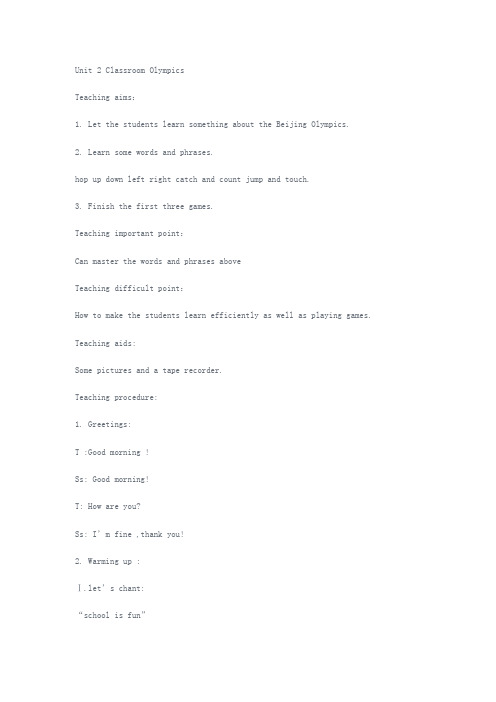
Unit 2 Classroom OlympicsTeaching aims:1. Let the students learn something about the Beijing Olympics.2. Learn some words and phrases.hop up down left right catch and count jump and touch.3. Finish the first three games.Teaching important point:Can master the words and phrases aboveTeaching difficult point:How to make the students learn efficiently as well as playing games. Teaching aids:Some pictures and a tape recorder.Teaching procedure:1. Greetings:T :Good morning !Ss: Good morning!T: How are you?Ss: I’m fine ,thank you!2. Warming up :Ⅰ.let’s chant:“school is fun”Ⅱ. Review the verbs:Listen and do:dancing running swimming jumping3. presentation:Ⅰ. Ask and answerT: do you like sports?Ss: Yes.T: Now I’ll show you a picture( the Olympic rings )T: Do you want to take part in the Olympic Games ? Today we’ll hold the Olympic Games in our classroom.Ⅱ. Read the title of the unitClassroom OlympicsⅢ. Learn the new word: hopListen and do .T does the action and let Ss tell the difference between “jump” and “hop”.and repeat the action .Ⅳ. Play the Game 1: Hop Hop and record the scores.Ⅴ. Learn the words: up down left rightⅰ. Attach a face on the blackboard.ⅱ. Point and learn“up down left right ”ⅲ. Read and point the four positions.Ⅵ. Play the Game2: Up down and record the scores.Ⅶ. Learnthe phrase: catch and countⅰ.Throw the basketball to a student and teach them to say “catch ”ⅱ.Repeat the action and say the word.ⅲ.Teach students to say : “one two ,count count.”“one two three four count count count count”ⅳ.play the Game 3:“ catch and count”and record the scores.Ⅷ. Summer the scores and see which group is the best.Ⅸ. Listen to the tape and repeat the words and phrases.Ⅹ.Homework.。
高中英语必修(2)Unit 2 The Olympic Games_教学设计(教案)
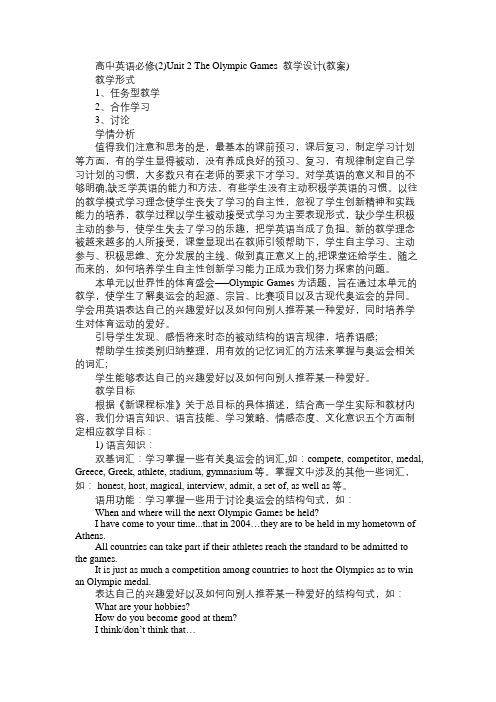
高中英语必修(2)Unit 2 The Olympic Games_教学设计(教案)教学形式1、任务型教学2、合作学习3、讨论学情分析值得我们注意和思考的是,最基本的课前预习,课后复习,制定学习计划等方面,有的学生显得被动,没有养成良好的预习、复习,有规律制定自己学习计划的习惯,大多数只有在老师的要求下才学习。
对学英语的意义和目的不够明确,缺乏学英语的能力和方法,有些学生没有主动积极学英语的习惯。
以往的教学模式学习理念使学生丧失了学习的自主性,忽视了学生创新精神和实践能力的培养,教学过程以学生被动接受式学习为主要表现形式,缺少学生积极主动的参与,使学生失去了学习的乐趣,把学英语当成了负担。
新的教学理念被越来越多的人所接受,课堂显现出在教师引领帮助下,学生自主学习、主动参与、积极思维、充分发展的主线、做到真正意义上的,把课堂还给学生。
随之而来的,如何培养学生自主性创新学习能力正成为我们努力探索的问题。
本单元以世界性的体育盛会──Olympic Games 为话题,旨在通过本单元的教学,使学生了解奥运会的起源、宗旨、比赛项目以及古现代奥运会的异同。
学会用英语表达自己的兴趣爱好以及如何向别人推荐某一种爱好,同时培养学生对体育运动的爱好。
引导学生发现、感悟将来时态的被动结构的语言规律,培养语感;帮助学生按类别归纳整理,用有效的记忆词汇的方法来掌握与奥运会相关的词汇;学生能够表达自己的兴趣爱好以及如何向别人推荐某一种爱好。
教学目标根据《新课程标准》关于总目标的具体描述,结合高一学生实际和教材内容,我们分语言知识、语言技能、学习策略、情感态度、文化意识五个方面制定相应教学目标:1) 语言知识:双基词汇:学习掌握一些有关奥运会的词汇,如:compete, competitor, medal, Greece, Greek, athlete, stadium, gymnasium等。
掌握文中涉及的其他一些词汇,如: honest, host, magical, interview, admit, a set of, as well as等。
高三英语必修二Unit2 The Olympic Games——奥林匹克运动会
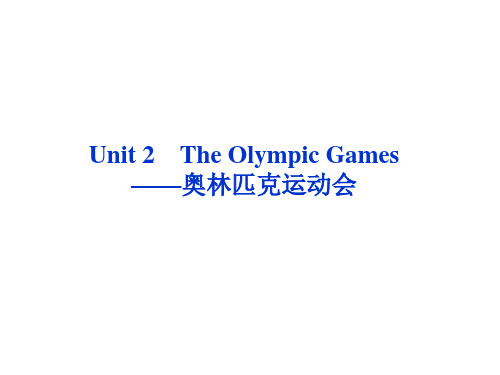
3.it作形式主语 It’s a great responsibility but also a great honour__t_o_b_e__ch__o_se_n____. 被选中不仅要承担巨大的责任同时也享有极大的荣誉。 4.what从句作介词宾语 I lived in _w__h_a_t_y_o_u__c_a_ll_______“Ancient Greece” and I used to write about the Olympic Games a long time ago. 我生活在你们所说的古希腊,很久以前我常常写关于奥运会 的报道。
目录
3.(2012·高考湖南卷)Don’t worry.The hard work that you do now ________later in life. A.will be repaid B.was being repaid C.has been repaid D.was repaid 解析:选A。考查动词时态和语态。从don’t可知语境为现在, 排除B、D;而later in life可知为将来的动作,故选A。
目录
考点串讲讲练互动
[单词精研] 1. compete vi. 比赛;竞争 (教材P9)How many countries competed in the ancient Olympic Games? 有多少国家参加古代奥运会?
目录
归纳拓展 (1)compete with/against sb.for sth.为争取某物和某人竞争 compete with sb./sth. 与……媲美,比得上 compete in 参加……比赛/竞争 (2)competition n. 比赛 be in competition with... 与……竞争 competitive adj. 有竞争力的 competitor n. 竞争者;对手
- 1、下载文档前请自行甄别文档内容的完整性,平台不提供额外的编辑、内容补充、找答案等附加服务。
- 2、"仅部分预览"的文档,不可在线预览部分如存在完整性等问题,可反馈申请退款(可完整预览的文档不适用该条件!)。
- 3、如文档侵犯您的权益,请联系客服反馈,我们会尽快为您处理(人工客服工作时间:9:00-18:30)。
bounce,
draw,
touch
Teaching steps:
Step1:
Bring some things to the classroom at the beginning of the class, throw them to the classes one by one and say: Catch! If they can understand What’s meaning, take out the pictures show to them and teach the new Words: ball window, blackboard, teacher,(use the high and low voice , How many fingers how many times to practice)
(3) Students can read the sentences of part 7 on page 11
Teaching difficulties
catch
Run to the ……
hop to…
walk to…
jump to….
blackboard
teacher,
Then chant it and do it: Draw a picture, Bounce the ball Catch a ball, run to the door. Catch a pen, hop to blackboard. Touch the table and count the numbers.
Step3 act out: Simon says : Hop to the blackboard Jump to the window
3
Simon says: Run to the door Simon says: Walk to the teacher. if there is no simon says they should Stop. Step 4: the numbers one two three four five six seven eight nine ten (给每位学生发一张数字卡片,老师喊口令 it is four,叫到的同学迅速站起 来并大声读出数字,扮演时钟 叫到的同学在原地转一圈。也可通过数字操, 用身体来表演数字来加深印像) Step 5: do the exercises(part six and part seven)
Homework : (1) 读 7-12 页的单词课文 并背诵默写 part2 的单词
(2)听磁带,每周三次 ,每次 15-20 分钟 (3)做试卷
Step2:Go to the playground play games and learn: Group them into two groups. Group one and group two have a race. Then queue in a line do some actions (Who is the fastest): Run to the door! Run to the table! Run to the window! window
Unit 2 Classroom Olympics
Teaching aims:
(1)Students can understand some simple actions and do it
(2)St of “catch、count .
